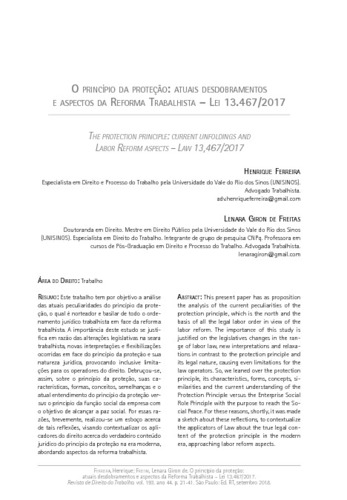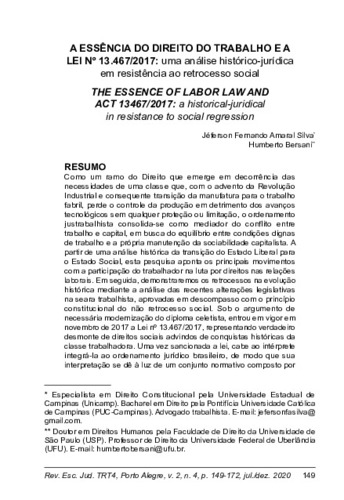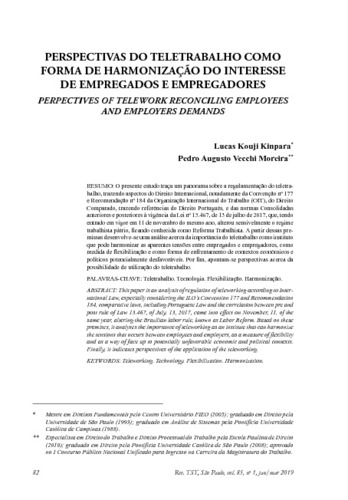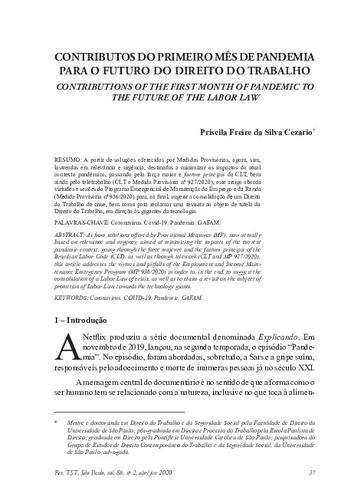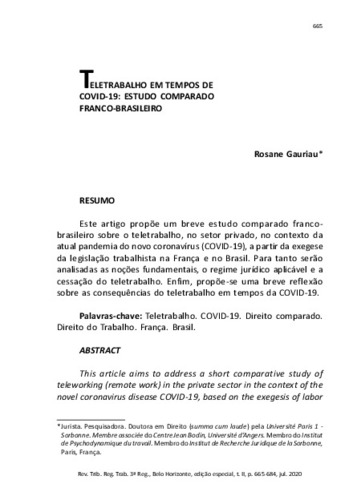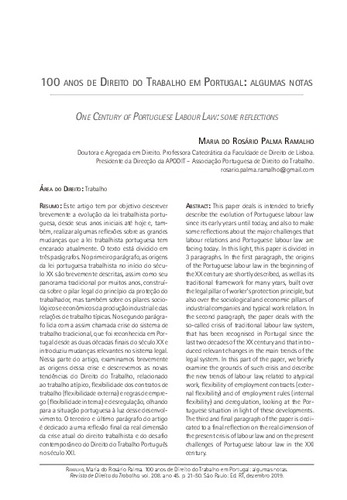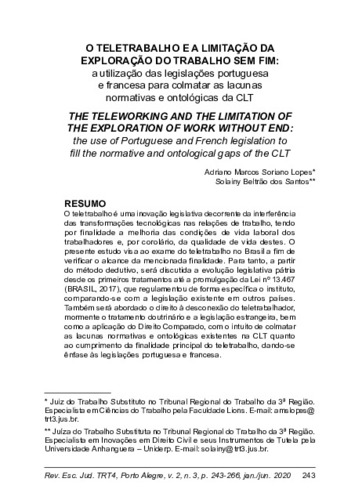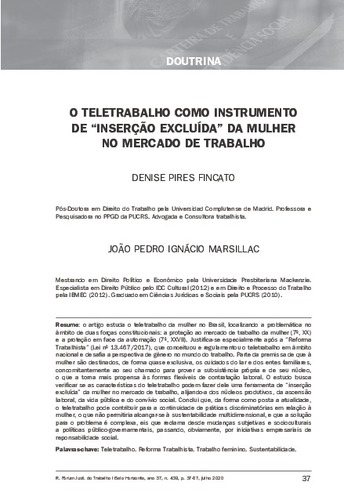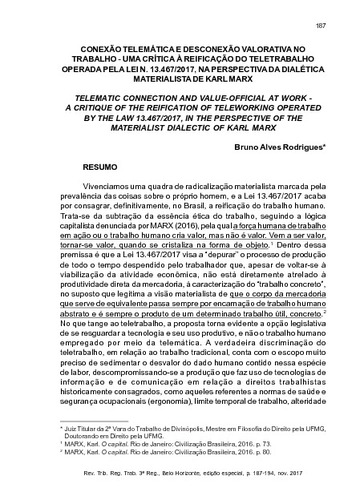Artigo de periódico
As novas regras sobre o teletrabalho e o princípio da proteção trabalhista: novo paradigma em construção
| dc.contributor.author | Fontenele, Lincoln Simões | |
| dc.date.accessioned | 2024-06-25T15:53:47Z | |
| dc.date.available | 2024-06-25T15:53:47Z | |
| dc.date.issued | 2022-12 | |
| dc.identifier.citation | FONTENELE, Lincoln Simões. As novas regras sobre o teletrabalho e o princípio da proteção trabalhista: novo paradigma em construção = New rules on teleworking and the labor protection principle: the development of a new paradigm. Revista da Escola Judicial do TRT4, Porto Alegre, v. 4, n. 7/8, p. 149-173, jan./dez. 2022. | pt_BR |
| dc.identifier.uri | https://hdl.handle.net/20.500.12178/234680 | |
| dc.description.abstract | [por] O regulamento do teletrabalho no Brasil desafia o princípio da proteção característico do direito do trabalho. Descreve-se em que medida a regulação do teletrabalho, inclusive durante a pandemia da covid-19, se afasta do princípio da proteção trabalhista. Para tanto, torna-se fundamental verificar, em um primeiro momento, as demandas econômicas sobre o teletrabalho, o que se faz a partir de uma pesquisa quantitativa com dados oriundos de questionários sobre experiências dos próprios trabalhadores nesse regime de trabalho. Em seguida, o artigo passa a fazer uma análise jurídico-dogmática das alterações legislativas concernentes ao teletrabalho, o que se faz tendo como objeto as mudanças na Consolidação das leis do trabalho (CLT) (BRASIL, 1943) introduzidas pela reforma trabalhista de 2017 (Lei n. 13.467 (BRASIL, 2017), onde se destacam os pontos de flexibilização jurídica que essa inovação legislativa permitiu. Após, a pesquisa mantém a análise dogmática para identificar, durante as mudanças legais no regime de direito emergencial do trabalho na pandemia da covid-19, pontos de convergência e divergência entre CLT e MP n. 927 (BRASIL, 2020a). Por fim, finaliza-se o artigo com uma avaliação do contraste entre o tradicional princípio da proteção trabalhista e as recentes reformulações do direito do trabalho brasileiro em relação ao teletrabalho. Chega-se à conclusão de que a regulação do teletrabalho realmente limitou o alcance do princípio protetivo, pois concedeu maior espaço à primazia do contrato individual do trabalho. | pt_BR |
| dc.description.abstract | [eng] The regulation of teleworking in Brazil is challenging the protection principle characteristic of labor law. This paper aims to describe in which extent the teleworking regulation, including during the COVID-19 pandemic, departs from the principle of labor protection. To do so, it becomes fundamental to verify, in a first step, the economic demands on teleworking, which is done from quantitative research with data from surveys on the experiences of the workers themselves under these working conditions. Then, the paper proceeds to a legal-dogmatic analysis of the legislative changes concerning teleworking, which is carried out by taking as object the changes in the Consolidation of Labor Laws introduced by the Labor Market Reform of 2017 (Law No. 13,467/2017), where the highlighted the points of legal flexibilization that this legislative innovation provided are highlighted. Afterwards, the research maintains the dogmatic analysis to identify, along the legal changes during the emergency labor law regime in the COVID-19 pandemic, convergence and divergence points between the Consolidation of Labor Laws and the Provisional Measure No. 927/2020. Finally, the paper concludes with an evaluation of the contrast between the traditional labor protection principle and the latest reformulations of the Brazilian Labor Law regarding teleworking. It concludes that this principle has been, since some decades ago, struggling with limitations imposed by legislative reforms, and the regulation of teleworking is an additional element in this trend, which does not seem to be slowing down. | pt_BR |
| dc.description.tableofcontents | O teletrabalho no desenvolvimento econômico -- A regulamentação do teletrabalho pela reforma trabalhista de 2017 (Lei n. 13.467/2017) e sua flexibilização jurídica -- A reprodução da flexibilização do teletrabalho no direito emergencial durante a pandemia da covid-19 pela MP n. 927/2020 -- O princípio da proteção trabalhista e seus limites diante do teletrabalho no Brasil | pt_BR |
| dc.language.iso | pt_BR | pt_BR |
| dc.relation | Brasil. Lei n. 13.467, de 13 de julho de 2017 | pt_BR |
| dc.relation | Brasil. Medida provisória n. 927, de 22 de março de 2020 | pt_BR |
| dc.relation.ispartof | Revista da Escola Judicial do TRT4: vol. 4, n. 7/8 (jan./dez. 2022) | pt_BR |
| dc.relation.uri | https://www.lexml.gov.br/urn/urn:lex:br:federal:lei:2017-07-13;13467 | pt_BR |
| dc.relation.uri | https://www.lexml.gov.br/urn/urn:lex:br:federal:medida.provisoria:2020-03-22;927 | pt_BR |
| dc.subject | Teletrabalho, Brasil | pt_BR |
| dc.subject | Teletrabalho, aspectos econômicos, Brasil | pt_BR |
| dc.subject | Flexibilização do trabalho, Brasil | pt_BR |
| dc.subject | Reforma trabalhista, Brasil | pt_BR |
| dc.subject | Covid-19, Brasil | pt_BR |
| dc.title | As novas regras sobre o teletrabalho e o princípio da proteção trabalhista: novo paradigma em construção | pt_BR |
| dc.title.alternative | New rules on teleworking and the labor protection principle: the development of a new paradigm | pt_BR |
| dc.type.genre | Artigo de periódico | pt_BR |
| dc.identifier.rvbisys | 001262356 | |
| dc.relation.ispartoflink | https://hdl.handle.net/20.500.12178/228536 | pt_BR |
Coleção
-
Artigos9527



